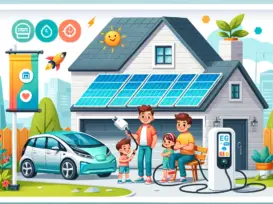Grus Home Energy - Residential EV rate plans
Exploring the Benefits of Residential EV Rate Plans
Residential EV rate plans are becoming increasingly popular as more homeowners transition to electric vehicles. These specialized rate plans offer a variety of benefits, including potential cost savings, convenient charging options, and environmental sustainability. By understanding the intricacies of these plans, homeowners can make informed decisions about their energy usage and electric vehicle charging habits.
One of the key advantages of residential EV rate plans is the potential for cost savings. These plans typically offer discounted electricity rates during off-peak hours, which can help homeowners save money on their overall energy bills. By charging their electric vehicles during these times, homeowners can take advantage of lower rates and reduce the cost of ownership for their EVs. Additionally, some utility companies offer special incentives or rebates for EV owners who enroll in these rate plans, further increasing the potential for savings.
Another benefit of residential EV rate plans is the convenience they offer for electric vehicle charging. Many plans include options for time-of-use pricing, which allows homeowners to schedule their EV charging during times when electricity rates are lowest. This flexibility enables homeowners to charge their vehicles overnight or during other off-peak hours, ensuring a full charge without the need to monitor the charging process constantly. Some plans even offer smart charging options that can automatically adjust charging times based on energy demand and pricing, further simplifying the process for homeowners.
In addition to cost savings and convenience, residential EV rate plans also support environmental sustainability. By encouraging homeowners to charge their electric vehicles during off-peak hours, these plans help reduce strain on the electrical grid and promote the use of renewable energy sources. Charging EVs when electricity demand is lowest can help balance the grid and make better use of existing resources, ultimately reducing greenhouse gas emissions and other environmental impacts associated with traditional fossil fuel vehicles.
For homeowners considering enrolling in a residential EV rate plan, it is important to carefully evaluate the terms and conditions of the plan to ensure it aligns with their energy needs and charging habits. Factors to consider include the structure of the rate plan, any associated fees or penalties, and the availability of charging options and incentives. Homeowners should also evaluate their current energy usage and charging patterns to determine the potential benefits of enrolling in a specialized rate plan.
In conclusion, residential EV rate plans offer a range of benefits for homeowners who own electric vehicles. From cost savings and convenience to environmental sustainability, these plans provide a compelling option for EV owners looking to optimize their energy usage and charging habits. By understanding the advantages of these plans and carefully evaluating their options, homeowners can make informed decisions about enrolling in a residential EV rate plan that meets their needs and preferences.
©2025 All Rights Reserved. Grus IoT Co.,Ltd.
